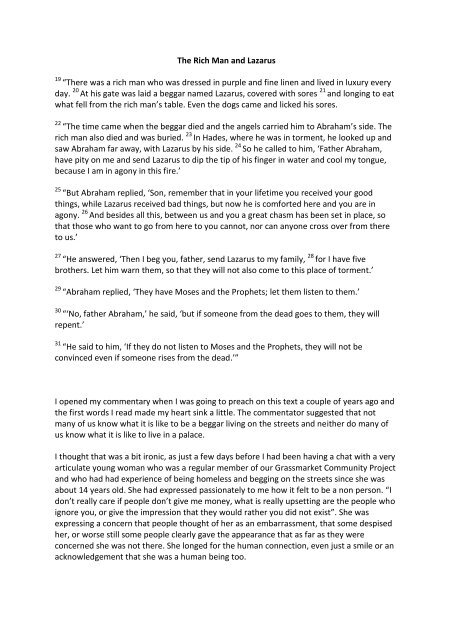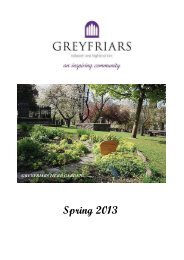The Rich Man and Lazarus 19 “There was a rich man who was ...
The Rich Man and Lazarus 19 “There was a rich man who was ...
The Rich Man and Lazarus 19 “There was a rich man who was ...
Create successful ePaper yourself
Turn your PDF publications into a flip-book with our unique Google optimized e-Paper software.
<strong>The</strong> <strong>Rich</strong> <strong>Man</strong> <strong>and</strong> <strong>Lazarus</strong><br />
<strong>19</strong> “<strong>The</strong>re <strong>was</strong> a <strong>rich</strong> <strong>man</strong> <strong>who</strong> <strong>was</strong> dressed in purple <strong>and</strong> fine linen <strong>and</strong> lived in luxury every<br />
day. 20 At his gate <strong>was</strong> laid a beggar named <strong>Lazarus</strong>, covered with sores 21 <strong>and</strong> longing to eat<br />
what fell from the <strong>rich</strong> <strong>man</strong>’s table. Even the dogs came <strong>and</strong> licked his sores.<br />
22 “<strong>The</strong> time came when the beggar died <strong>and</strong> the angels carried him to Abraham’s side. <strong>The</strong><br />
<strong>rich</strong> <strong>man</strong> also died <strong>and</strong> <strong>was</strong> buried. 23 In Hades, where he <strong>was</strong> in torment, he looked up <strong>and</strong><br />
saw Abraham far away, with <strong>Lazarus</strong> by his side. 24 So he called to him, ‘Father Abraham,<br />
have pity on me <strong>and</strong> send <strong>Lazarus</strong> to dip the tip of his finger in water <strong>and</strong> cool my tongue,<br />
because I am in agony in this fire.’<br />
25 “But Abraham replied, ‘Son, remember that in your lifetime you received your good<br />
things, while <strong>Lazarus</strong> received bad things, but now he is comforted here <strong>and</strong> you are in<br />
agony. 26 And besides all this, between us <strong>and</strong> you a great chasm has been set in place, so<br />
that those <strong>who</strong> want to go from here to you cannot, nor can anyone cross over from there<br />
to us.’<br />
27 “He answered, ‘<strong>The</strong>n I beg you, father, send <strong>Lazarus</strong> to my family, 28 for I have five<br />
brothers. Let him warn them, so that they will not also come to this place of torment.’<br />
29 “Abraham replied, ‘<strong>The</strong>y have Moses <strong>and</strong> the Prophets; let them listen to them.’<br />
30 “‘No, father Abraham,’ he said, ‘but if someone from the dead goes to them, they will<br />
repent.’<br />
31 “He said to him, ‘If they do not listen to Moses <strong>and</strong> the Prophets, they will not be<br />
convinced even if someone rises from the dead.’”<br />
I opened my commentary when I <strong>was</strong> going to preach on this text a couple of years ago <strong>and</strong><br />
the first words I read made my heart sink a little. <strong>The</strong> commentator suggested that not<br />
<strong>man</strong>y of us know what it is like to be a beggar living on the streets <strong>and</strong> neither do <strong>man</strong>y of<br />
us know what it is like to live in a palace.<br />
I thought that <strong>was</strong> a bit ironic, as just a few days before I had been having a chat with a very<br />
articulate young wo<strong>man</strong> <strong>who</strong> <strong>was</strong> a regular member of our Grassmarket Community Project<br />
<strong>and</strong> <strong>who</strong> had had experience of being homeless <strong>and</strong> begging on the streets since she <strong>was</strong><br />
about 14 years old. She had expressed passionately to me how it felt to be a non person. “I<br />
don’t really care if people don’t give me money, what is really upsetting are the people <strong>who</strong><br />
ignore you, or give the impression that they would rather you did not exist”. She <strong>was</strong><br />
expressing a concern that people thought of her as an embarrassment, that some despised<br />
her, or worse still some people clearly gave the appearance that as far as they were<br />
concerned she <strong>was</strong> not there. She longed for the hu<strong>man</strong> connection, even just a smile or an<br />
acknowledgement that she <strong>was</strong> a hu<strong>man</strong> being too.
I wanted to say to the person <strong>who</strong>’d written the commentary, “yes, you are right, few of us<br />
know what it is like to be <strong>Lazarus</strong>, but it would not take you long to find someone <strong>who</strong> does<br />
know. Even in our modern society, there are people <strong>who</strong> could tell you exactly what it is like<br />
to feel like <strong>Lazarus</strong>”.<br />
Indeed, before all of this I had just been reading about Prince William <strong>who</strong> had spent a night<br />
on the streets of London sleeping rough, just to get a sense of what it is like for people. He’d<br />
done this quietly <strong>and</strong> without publicity <strong>and</strong> I had thought, all credit to him for seeking to get<br />
a least a sense of how it must feel to be so vulnerable.<br />
I guess that one of the most important aspects of our work in the Grassmarket Community<br />
Project is to connect people <strong>who</strong>se lives would otherwise hardly ever overlap <strong>and</strong> transform<br />
attitudes. In making connections we don’t just transform or “fix” the lives of beggars like<br />
<strong>Lazarus</strong>, we also hope to challenge <strong>and</strong> transform the imagination of the helper. We<br />
facilitate that hu<strong>man</strong> connection where community is built in a way that never happened<br />
between the <strong>Rich</strong> <strong>Man</strong> <strong>and</strong> <strong>Lazarus</strong>. Dostoevsky once wrote these words that could have<br />
been an appeal to this <strong>rich</strong> <strong>man</strong> <strong>and</strong> other like him <strong>who</strong> simply disregard throughout their<br />
lives the plight of their fellow hu<strong>man</strong> beings, “<strong>Man</strong>, <strong>man</strong>, one cannot live quite without<br />
pity!” Perhaps it is true that we cannot become fully hu<strong>man</strong> <strong>and</strong> fully alive without that<br />
capacity for making the hu<strong>man</strong> connection.<br />
Compassion, empathy, the capacity to enter into another’s sorrow <strong>and</strong> pain or else share<br />
their joy <strong>and</strong> laughter is an essential hu<strong>man</strong> quality, without it we cannot be fully alive. In<br />
order to hurt others we have to immunise ourselves against such connections <strong>and</strong> this is<br />
what the <strong>Rich</strong> <strong>Man</strong> (Dives as some sources call him) has successfully accomplished<br />
throughout his life. He has refused to notice the beggar at his gate, he has failed to see the<br />
lines of experience <strong>and</strong> suffering that can give dignity <strong>and</strong> character <strong>and</strong> even a kind of<br />
beauty to the hu<strong>man</strong> face. Even the dogs gave <strong>Lazarus</strong> more comfort by licking his sores<br />
than he got from Dives.<br />
So, my commentator <strong>was</strong> right up to a point, we do not know what it is like to be a beggar,<br />
but when we hu<strong>man</strong>ize the other rather that objectivising them we can begin to share<br />
something of their experience <strong>and</strong> hu<strong>man</strong>ity <strong>and</strong> we can be moved.<br />
My friendly commentator then went on to talk about the <strong>Rich</strong> <strong>Man</strong> in his fine palace. He<br />
declared that not <strong>man</strong>y of us know what it is like to fare sumptuously every day, to wear<br />
fine clothes <strong>and</strong> live in the lap of luxury. Well, this is true. But the irony of all of this <strong>was</strong> not<br />
lost on me as this <strong>was</strong> the very text that the Lectionary had given me to preach on for the<br />
Sunday on which I <strong>was</strong> due to lead worship in the presence of Her Majesty the Queen!<br />
If ever there <strong>was</strong> a hu<strong>man</strong> being on the planet <strong>who</strong> knew what it <strong>was</strong> like to live like the <strong>Rich</strong><br />
<strong>Man</strong> in our story, it <strong>was</strong> her!
So, my commentator <strong>was</strong> not exactly being helpful, but I felt that the text <strong>was</strong> too much of a<br />
providential gift not to preach on.<br />
I found myself drawn to these concluding remarks from the mouth of Abraham, “even if<br />
someone should rise from the dead, they’ll pay no heed”. What, I wondered <strong>was</strong> Abraham<br />
getting at? I found myself suggesting that even religious people, even those <strong>who</strong><br />
acknowledge a doctrine like the resurrection of the dead, even those <strong>who</strong> can swallow the<br />
<strong>who</strong>le institutional banquet of faith might still sometimes not “get it”. I suggested that faith<br />
is as much a heart thing as it is a head thing – not just a matter of propositions <strong>and</strong> doctrines<br />
but something that we feel with an inner organ of the heart. After all, did not the Lord<br />
declare through his prophet Jeremiah, “I will set my law within them <strong>and</strong> write it on their<br />
hearts”.<br />
So maybe there are religious people <strong>who</strong> are a bit like Abraham suspects the <strong>Rich</strong> <strong>Man</strong> <strong>and</strong><br />
his brothers to be, they know <strong>who</strong> Abraham is, they are probably upright <strong>and</strong> faithful<br />
citizens <strong>who</strong> visit the Temple regularly <strong>and</strong> outwardly do all the right things as people of<br />
faith, but they are people <strong>who</strong> also pay no heed <strong>and</strong> have not switched on this inner organ<br />
of the heart where the Lord has placed his law in a new covenant relationship.<br />
After this service at Crathie Kirk, I <strong>was</strong> being quizzed before lunch back at Balmoral Castle as<br />
we tucked into a stiff <strong>and</strong> very welcome gin <strong>and</strong> tonic by a worshipper <strong>who</strong>’d heard the<br />
sermon <strong>and</strong> clearly wanted to hear more. “Are you really saying that there are people <strong>who</strong><br />
are fully signed up members of the church <strong>who</strong> still might not get it”, he asked? “Yes”, I<br />
replied, “that is exactly what I <strong>was</strong> saying”. <strong>The</strong> wonderful Duke of Edinburgh, <strong>who</strong> <strong>was</strong><br />
st<strong>and</strong>ing with us piped up at this point, “absolutely right” he boomed, “like 80% of the<br />
people in the bloody church this morning!”<br />
Your should be aware that for a relatively remote rural parish Crathie Kirk is remarkably well<br />
attended, especially when the Royal Family is in residence at Balmoral. It also struck me as a<br />
bit odd that most people sat at one side of the Kirk, the side at which they could get a good<br />
view of the Royal Pew!<br />
As <strong>man</strong>y have said, we cannot really hear the Bible stories unless we hear them as stories<br />
about ourselves. And it would be true of most of us that we have all been a bit like the <strong>Rich</strong><br />
<strong>Man</strong>, oblivious to the people <strong>and</strong> circumstances around us. <strong>The</strong> challenge is to avoid<br />
cultivating a deliberate immunity.<br />
My guess is that Jesus came not to found a new religion with all its pomp <strong>and</strong> power, its<br />
institutions <strong>and</strong> hierarchies, its authority structures <strong>and</strong> hierarchies in which people find<br />
ways of insulating themselves from others <strong>and</strong> ways to do others down. Rather, he<br />
announced something much more radical.<br />
Throughout the <strong>who</strong>le of his ministry Jesus stayed among the ordinary simple people of<br />
rural Palestine. Only rarely did he venture to the seat of power at Jerusalem, the Temple.
And there, of course, in the epicentre of power, he met those <strong>who</strong> plotted to do away with<br />
him. Jesus lived the life of a simple Galilean peasant. In a world of extravagant wealth he<br />
chose to live simply. In a world that makes a virtue of celebrity, he chose to give his<br />
attention to the disregarded <strong>and</strong> treat all, high <strong>and</strong> low alike with the same reverence <strong>and</strong><br />
tenderness. In a world where people enjoyed exercising power <strong>and</strong> control, he renounced<br />
power <strong>and</strong> walked humbly with his God, loving mercy <strong>and</strong> doing justice.<br />
He came, in the words of Greek poet, “to tame the savageness of <strong>man</strong> <strong>and</strong> make gentle the<br />
life of the world”. This remains our task, the task of Christ’s church, which seeks to be the<br />
Christ to the world today. And of course we have to allow our hearts to be broken <strong>and</strong><br />
moved by what we see around us, for there is so much still to do. We may not accomplish a<br />
new world order of usher in the kingdom, but we must not remain unmoved <strong>and</strong> inert.<br />
Let me conclude with some words from CS Lewis that are an appeal to this inner organ of<br />
the heart where the Lord has placed his law <strong>and</strong> which we must not allow to remain always<br />
hard <strong>and</strong> immune: “Love anything <strong>and</strong> your heart will be wrung <strong>and</strong> possible broken. If you<br />
want to make sure of keeping it intact you must give it to no one, not even an animal. Wrap<br />
it carefully round with hobbies <strong>and</strong> little luxuries; avoid all entanglements. Lock it up safe in<br />
the casket or coffin of your selfishness. But in that casket, safe, dark, motionless, airless, it<br />
will change. It will not be broken; it will become unbreakable, impenetrable, irredeemable.<br />
To love is to be vulnerable”.<br />
This is Jesus message to us from the story of the <strong>Rich</strong> <strong>Man</strong> <strong>and</strong> <strong>Lazarus</strong>. We may not know<br />
what it is like to be a beggar or live in a palace, but our task is to awaken that inner organ of<br />
the heart where the Lord has put his law <strong>and</strong> begin that journey towards awareness,<br />
compassion, pity <strong>and</strong> feeling that is the only hope for the world to overcome the hatred <strong>and</strong><br />
cruelty that so often erupts to tear communities apart.<br />
Amen.





